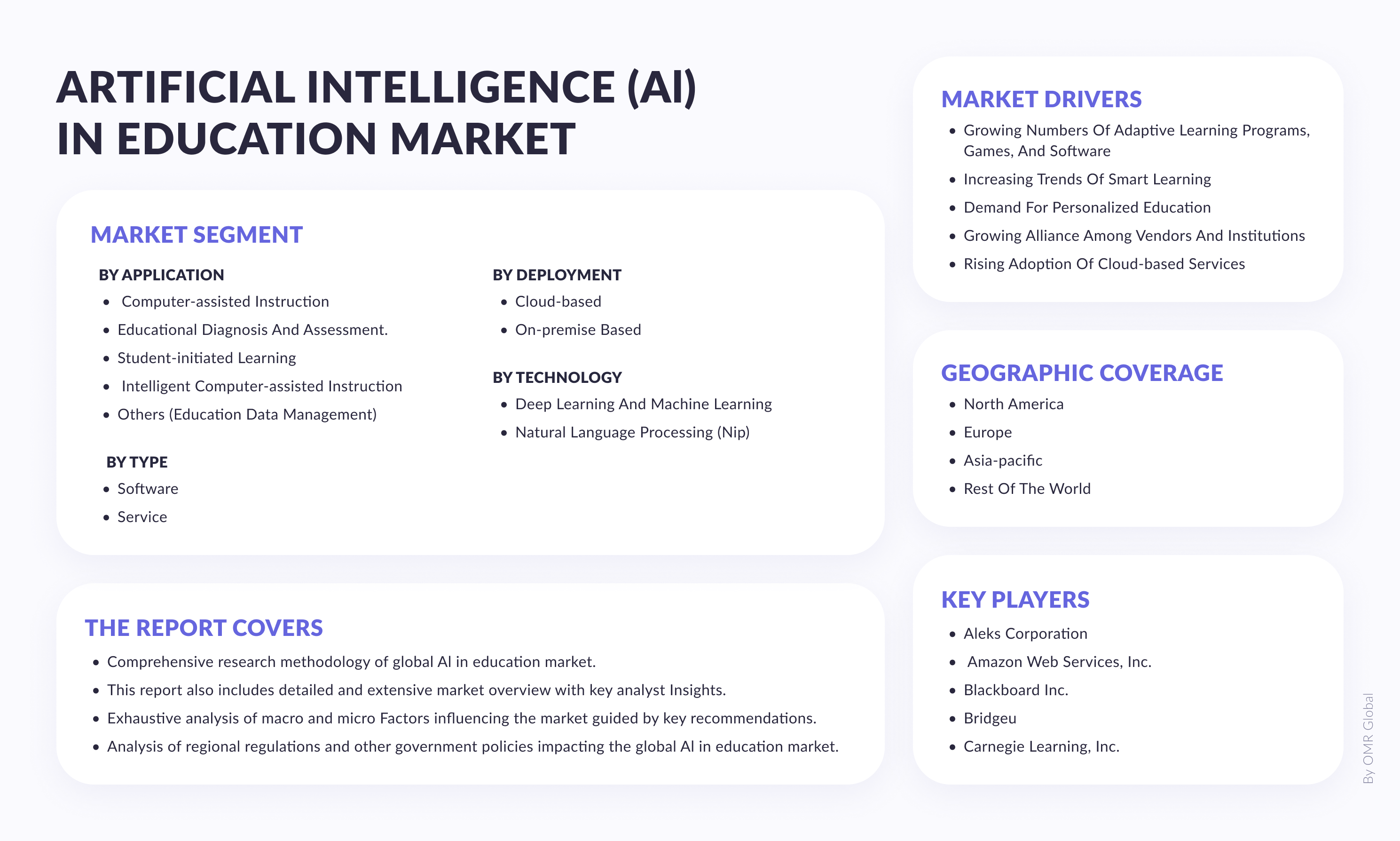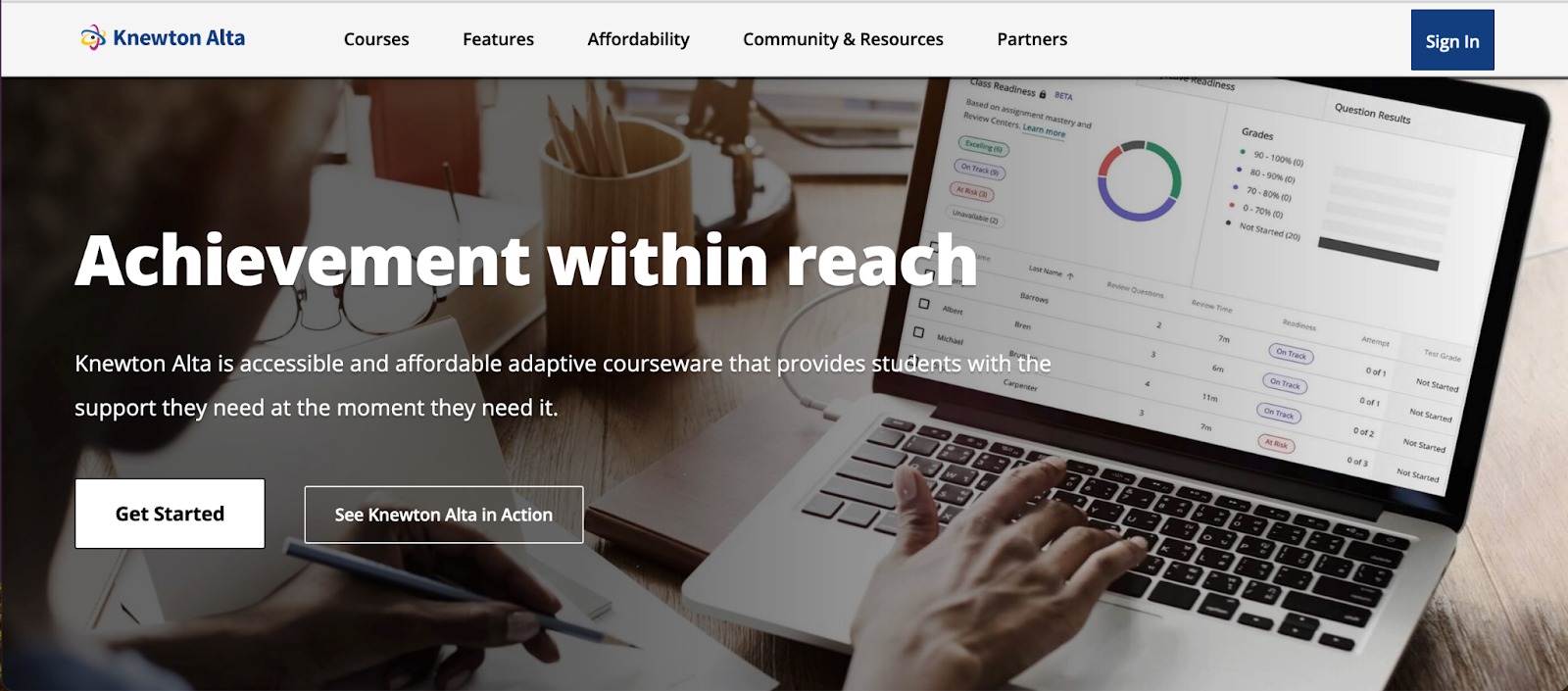The year 2024 has seen a tremendous boom in the popularity of artificial intelligence (AI), with the technology making significant strides in various industries, including the education sector. Many companies already use AI in the education industry to solve complex problems, automate processes, and make informed decisions, among other things.
AI revolutionizes how we think about learning and development in the education industry, extending beyond the traditional teacher-student relationship. According to Forbes, from virtual learning assistants and plagiarism detection to AI-driven career guidance, AI tools can also increase productivity by 30%.
This article will explore the top 8 cases of using AI in the Edtech industry, showcasing the latest and most innovative solutions driving change in the education sector.
AI trends in education
Before diving deep into examples of artificial intelligence in education, let’s discover some promising trends in learning management.
Personalized education
If you want to implement AI, you can create customized learning experiences for each student based on their learning style, preferences, and progress. Personalization enables students to learn at their own pace and in a way that best suits their needs.
Tutoring systems
Another area where AI EdTech is making a significant impact is intelligent tutoring systems. These systems use Generative AI algorithms to provide individualized tutoring and student feedback. This helps students understand complex concepts better and improve their overall academic performance.
NLP virtual assistants
Natural language processing (NLP) is gaining momentum in the education industry. We can use it to develop a chatbot or virtual assistant that can help answer student questions and provide support. NLP reduces teachers' workload and allows students to receive immediate assistance with their queries.
Gamification
AI in gamification revolutionizes the education process and improves learning management. Educational organizations can use EdTech AI technologies to create personalized games that help boost students' learning and reinforce key concepts. This makes learning fun and engaging and enhances students' retention of the material.
Grading
Generative AI in Edtech can grade the reviews in education, making them faster and more reliable. Moreover, it allows students to get more personalized and detailed feedback on their performance.
Curriculum design
Finally, EdTech AI algorithms can be used to develop and adapt curriculum materials to meet the needs of individual students. By analyzing students' performance data, AI can identify gaps in their learning and recommend appropriate materials to help fill them.
Of course, no AI tool will replace human interaction and offline K-12, higher education institutions, and offline courses, but they may help bring it to the next level.
How is AI used in Edtech?
AI in Edtech helps reduce teachers’ and professors’ routine workloads, make personalized and adaptive learning fun for students, facilitate entry into new professions, and support students morally. Let's look at how exactly AI technology is used in Edtech.
Personalized learning path
Duolingo and Thinkster use AI algorithms to make learning an experience as personalized as possible. From the beginning, Duolingo creates customized exercises at appropriate difficulty levels based on a language proficiency test and adjusts them accordingly as users progress through the lessons. A speech recognition system for improving pronunciation is also included. Thinkster starts with an assessment that pairs students with a personalized math learning path that adjusts as they go. Tutor-led sessions are also on the platform, and student analytics are used to carry out personalized lessons to make learning more effective.
Automation of routine for teachers
Streamlining routine tasks for educators is pivotal in fostering quality education. The effectiveness of teaching methods hinges on a teacher's creativity, presentation skills, student engagement & critical thinking. However, grading tests, homework, and essays often consume much of their time.
Neural network-based solutions offer respite from these routine tasks. Gradescope helps educators grade physics, math, chemistry, and biology tests. It scans assignments, analyses handwritten text, compares answers, identifies errors, and provides targeted feedback for improvement.
Virtual assistants and chatbots
In various educational areas, from general education to vocational training, virtual assistants and AI chatbots quickly answer student queries about lecture content or class schedules, which is the same as reducing educators' work. They contribute to the learning process by suggesting supplemental materials or videos and effectively supporting students in comprehending new subjects.
Post-course surveys collect feedback and simplify the course evaluations and feedback-gathering process by gathering student opinions and training quality. They also help students organize tasks and keep track of due dates. Chatbots provide instant support and guidance in distance learning environments, compensating for the lack of available teachers.
Predictive analytics
Predictive education analytics focuses on predicting what will happen in the future. For example, the total number of students enrolled in a particular course over the past 5 years can be used to predict how many students will enroll in subsequent years.
This emerging technology brings immense advantages to the education sector, revolutionizing various facets.
1. Enhancing operational efficiency: Educational institutions grapple with challenges like student performance gaps or resource mismanagement. Predictive analytics curbs costly disruptions preempts issues before they occur, and ensures easy operations and learning continuity.
2. Personalizing student support: Predictive models use historical data to identify at-risk students and pinpoint potential academic struggles early. This allows educators to intervene proactively, offering tailored support and interventions, thus improving student outcomes.
3. Optimizing resource allocation: Efficiently managing educational resources is crucial. Predictive analytics assists in forecasting demand for educational materials, courses, and facilities, ensuring the availability of resources aligned with student needs.
4. Streamlining enrollment and student success: Institutions leverage predictive analytics to forecast enrollment trends and identify factors impacting student success. This facilitates informed decision-making in admissions, course planning, and student support strategies, fostering higher retention rates and academic achievement.
5. Supporting data privacy: Learning companies are targets for cyber threats. Predictive models enable the identification of potential vulnerabilities, allowing for proactive security enhancements and risk mitigation, safeguarding sensitive student data and organizational integrity.
E-learning and more
Expand your expertise with a complete Edtech guide. Everything you need to know about the industry in one place
Benefits of AI in Edtech
Now, let’s explore a few promising advantages AI brings to educational institutions and students:
Improved student outcomes
AI-powered educational tools can help students better understand complex concepts, leading to improved academic performance and higher graduation rates. Furthermore, these tools can also take account of an individual’s progress and suggest recommendations for further improvement.
Enhanced efficiency
Automating grading assignments and other administrative tasks saves teachers and professors valuable time, allowing them to focus on teaching students and providing individualized student support. All of this can boost efficiency, so students spend more time engaging in interactive and enjoyable learning activities.
Cost-effectiveness
AI-powered solutions can be more cost-effective than traditional educational methods, particularly in remote or distance learning scenarios where physical resources may be limited. Through scalable AI tools, institutions can provide high-quality education with very little infrastructure required.
Greater accessibility
Generative AI solutions can provide greater access to education for those in remote or underserved areas, allowing students to learn from the best instructors and use any educational materials around the world. This creates possibilities for learners who may be otherwise held back because of geography or finances.
How do companies use AI in Edtech?
Let’s discuss some of the most popular examples of AI companies in the Edtech sector.
Knewton Alta
Knewton Alta is an EdTech AI startup that specializes in personalized learning solutions. Founded in 2008, Knewton Alta has developed an AI-powered platform that analyzes data on students' learning behaviors and provides customized recommendations to optimize their educational experience.
With its AI-enabled technology, the company has taken personalized learning to the next level. They now use ML algorithms to analyze students' learning behaviors and personalize their learning experiences accordingly. Students receive custom lesson plans, educational content recommendations, and study strategies tailored to their learning styles, preferences, and progress.
Let's say your student can’t master a concept; Knewton’s AI sees the problem and helps with additional practice or a virtual tutoring note, feedback, etc. It also works when the student is prepared to know more content or wants extra work, consistent with the student’s engagement and support.


Thank you for Subscription!
Carnegie Learning
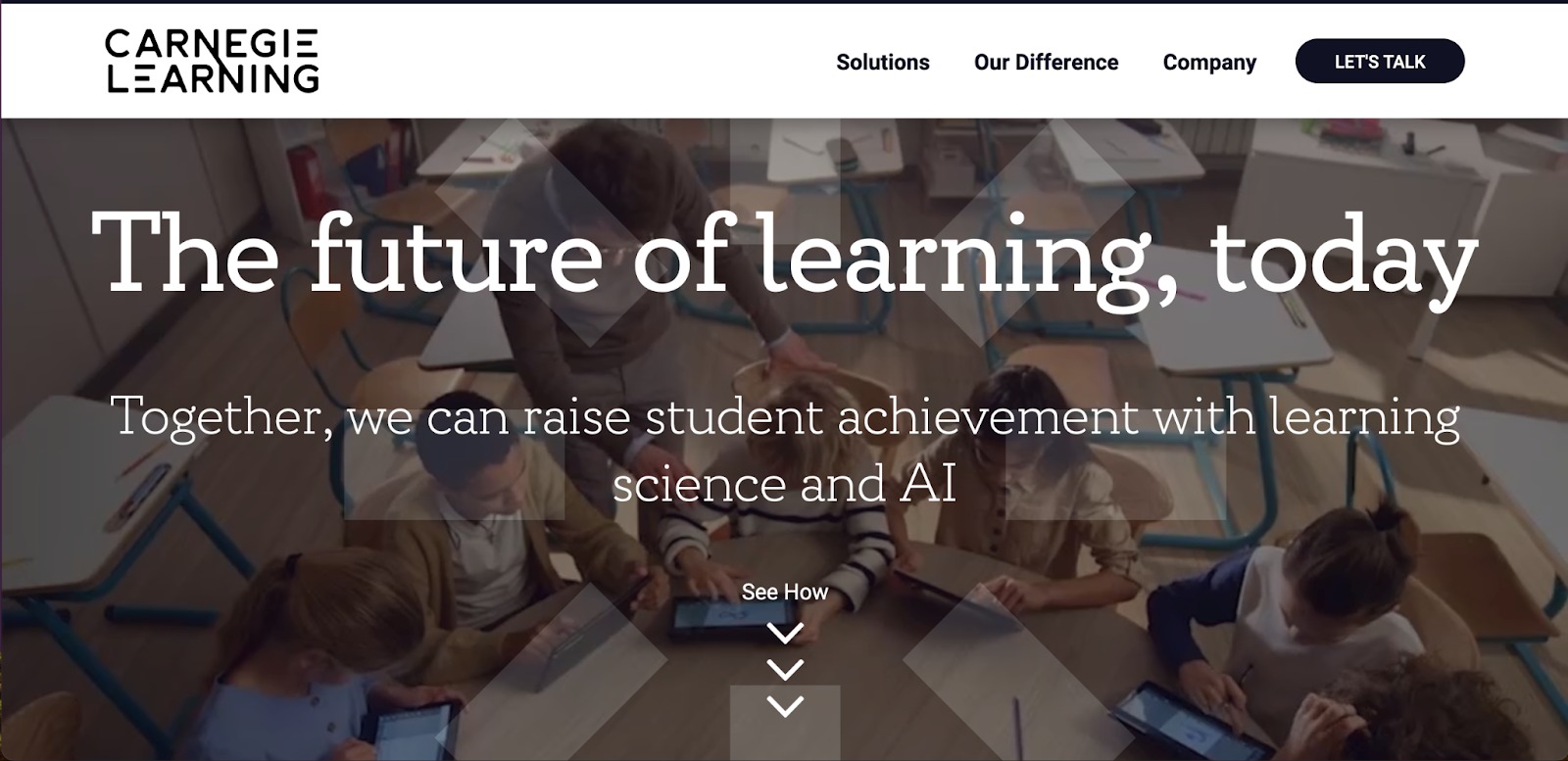
Carnegie Learning is an education technology company that provides AI-powered adaptive learning solutions for K-12 schools. The company was founded in 1998 and is based in Pittsburgh, Pennsylvania.
Carnegie Learning's AI-powered platform uses cognitive and learning science research to provide personalized learning experiences for students. The platform uses AI data analytics to track students' progress and adjust the difficulty level of lessons based on their performance.
In addition, Carnegie Learning's AI technology provides detailed data analytics to educators, allowing them to track student data and progress and make data-driven decisions to improve instructional practices. This helps any educator better understand individual students' needs and provide targeted support to help them succeed.
Duolingo
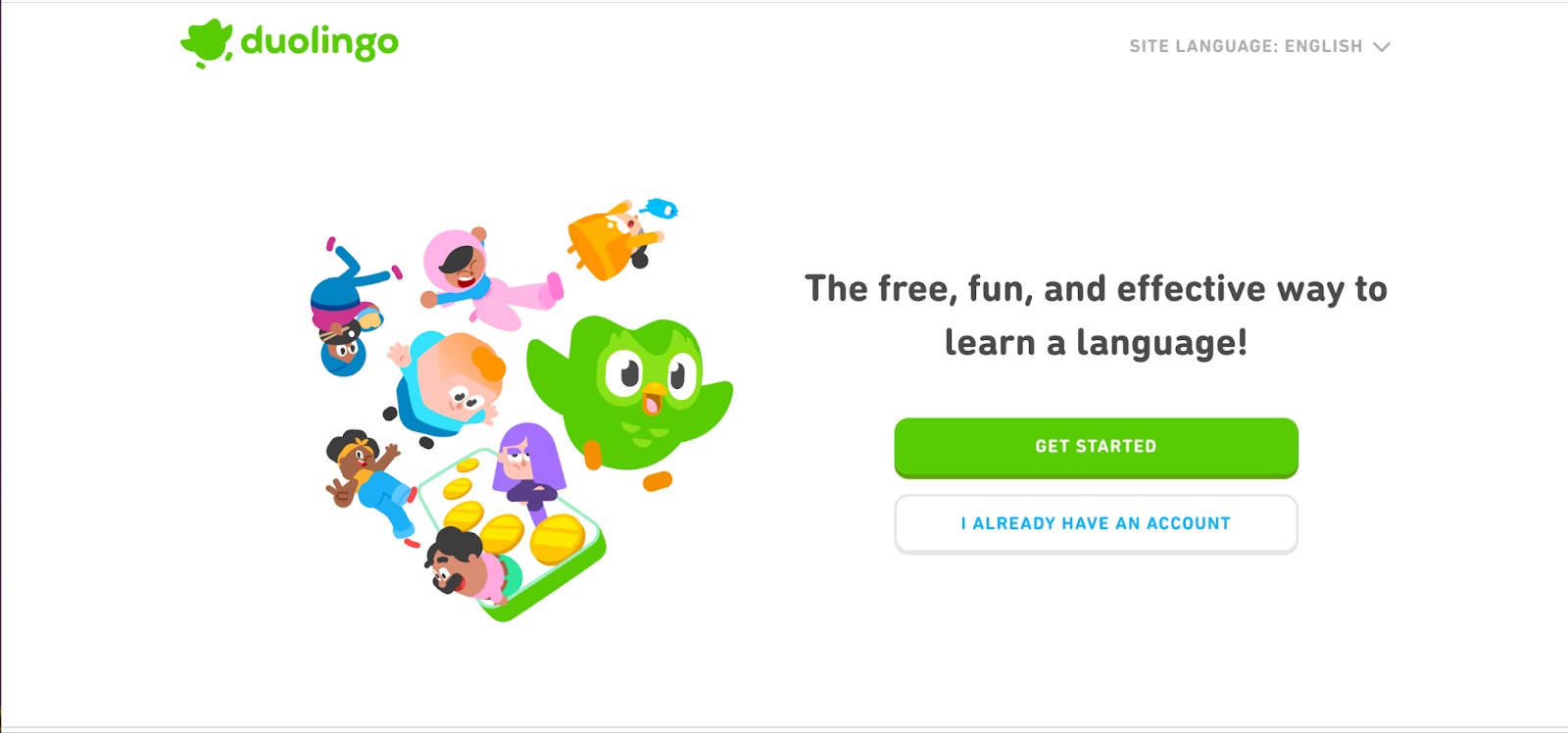
Duolingo is a popular language-learning platform that offers courses in over 40 languages. It was founded in 2011 by Luis von Ahn and Severin Hacker and is headquartered in Pittsburgh, Pennsylvania. The free platform offers a gamified approach to language learning, with users earning points and unlocking achievements as they progress through the courses.
The chatbots from Duolingo are built using Natural Language Processing (NLP) to support learners by providing real-time feedback and answering questions in their language. NLP makes human-computer interaction in natural language effective, optimizing the learning process. In this case, the chatbots use machine learning algorithms to analyze student input, pick what they would do wrong, and give personal feedback. This approach makes learners feel supported and motivated, and gives contextualized language examples tailored to their needs.
Quizlet
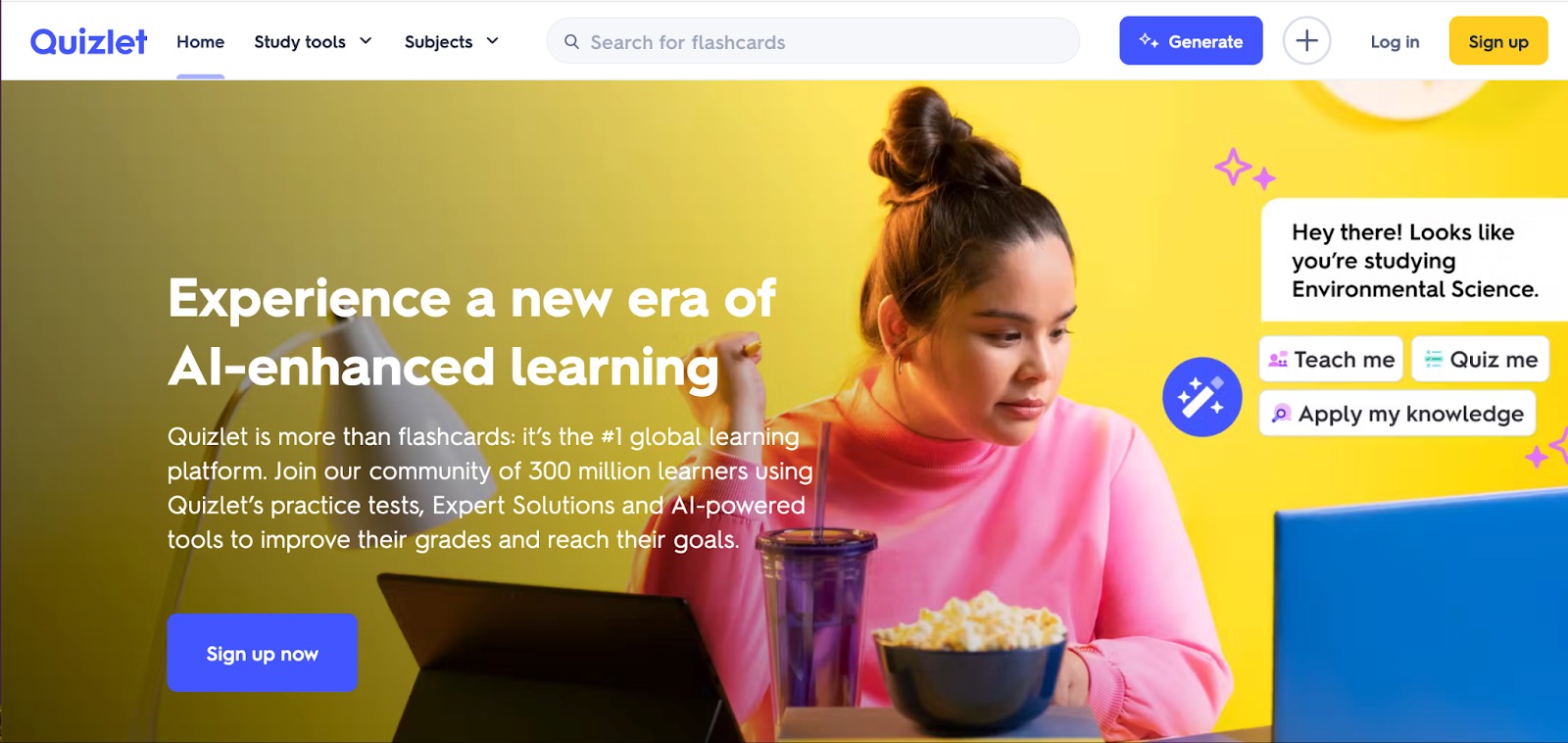
Quizlet is an online learning platform that allows students to create, share, and study with flashcards, games, and other study tools. The platform was founded in 2005 and has since become one of the most popular online learning platforms, with millions of users worldwide.
Quizlet uses gamification to engage students. It uses matching, multiple-choice, and more challenging timed games to make learning fun and reinforce knowledge. Such games aim to incentivize students and boost their confidence.
By studying students’ test performance, AI algorithms personalize the learning experience by recommending tailored study materials and games. This is shown by guiding visual learners to games that pair images with words and auditory learners to games that involve listening and identifying answers. They ensure you stay engaged and supported in a way that aligns with your learning preferences.
Coursera
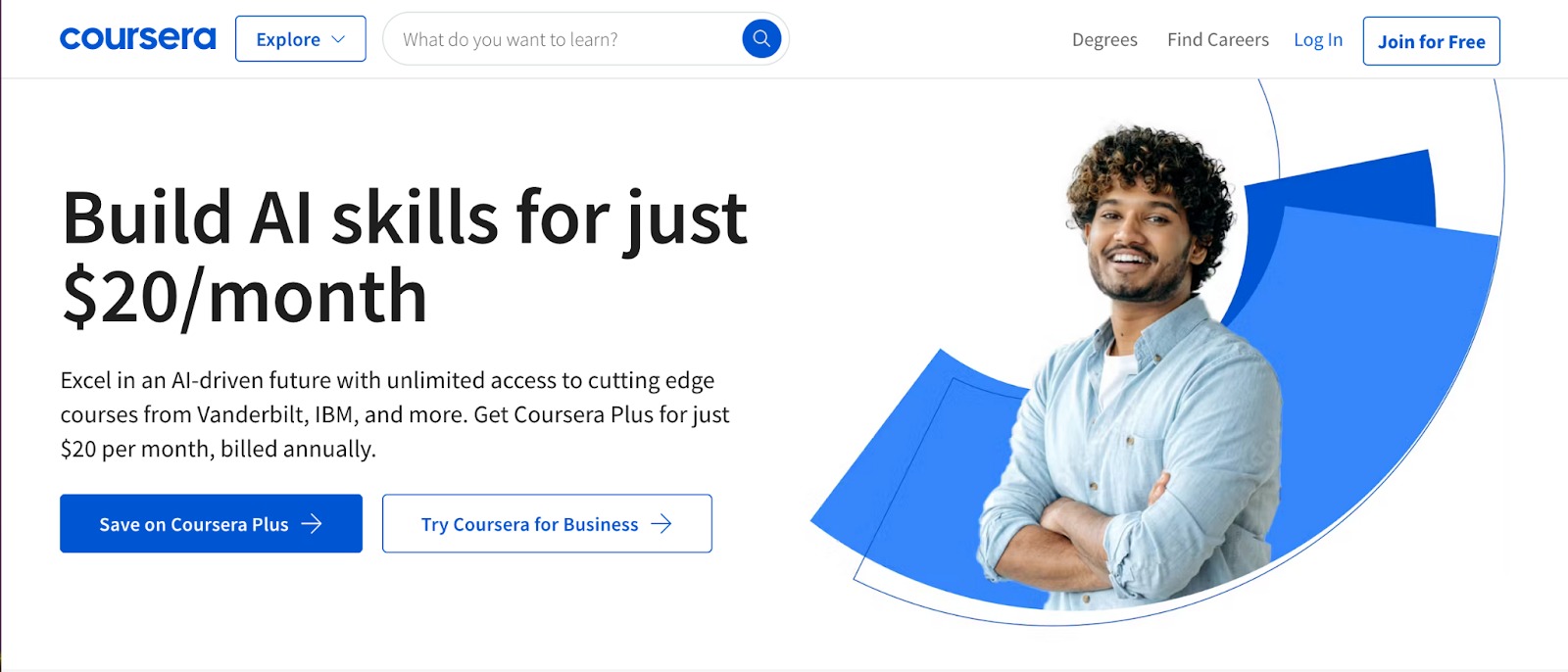
Coursera is an online learning platform founded in 2012 by Stanford University professors Andrew Ng and Daphne Koller. The platform offers courses and specializations in various fields, such as computer science, data science, business, and humanities.
Coursera uses an ML/AI-powered grading system to analyze student submissions, look for patterns, such as common mistakes, and create targeted feedback. This move makes teaching easier for instructors and studying more manageable for students. Such automation saves instructors’ time by eliminating the need to write the same corrections repeatedly, freeing time to provide specific feedback. Students. in turn, get immediate insights into their understanding and study habits.
5mins
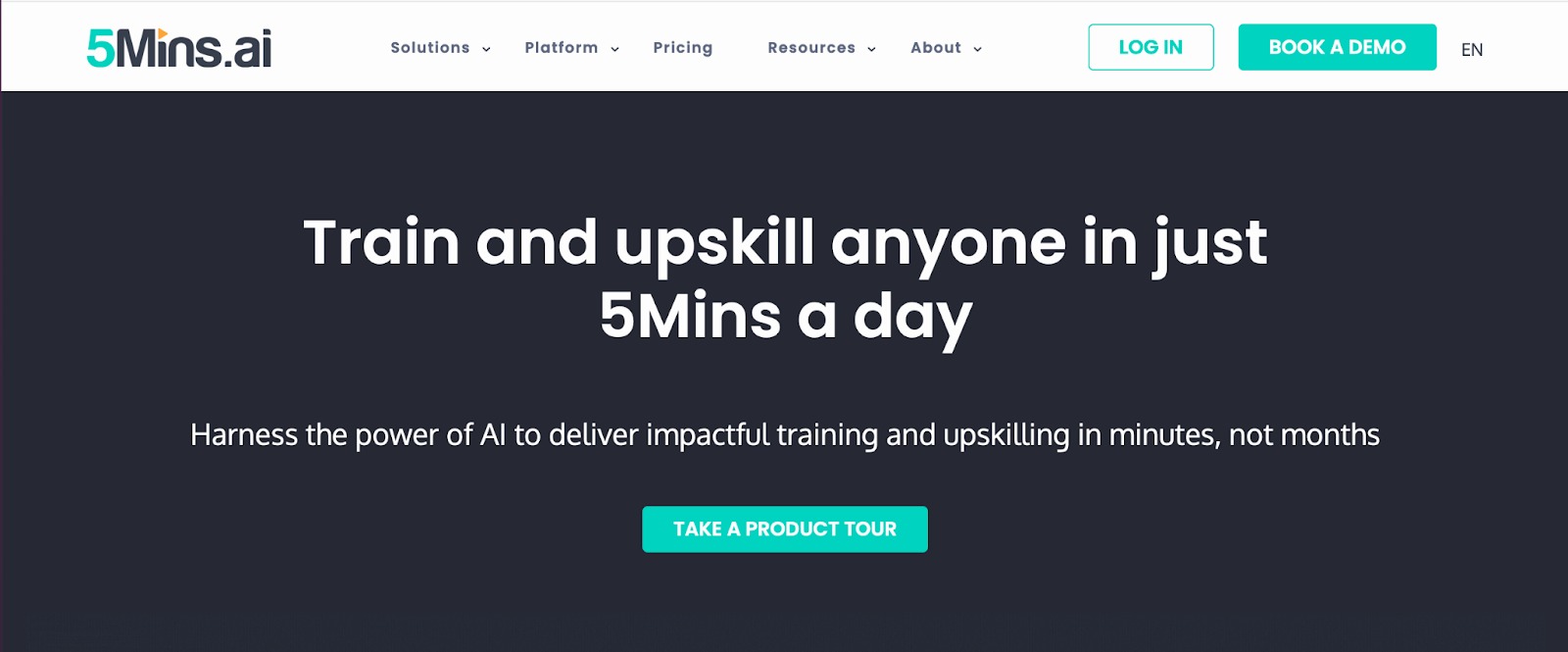
5Mins AI is a modern platform established in 2021 to provide employee training content. This unique platform allows staff to access learning materials like social media content, providing an engaging and interactive learning experience. The platform incorporates a stylistic design inspired by the popular app TikTok. With a personalized algorithm, training videos are presented in a scrolling format, making it easier for employees to digest the content and retain the knowledge gained.
Riiid

Riiid is an AI-based EdTech company that uses machine learning algorithms to provide personalized learning experiences to students. The company was founded in South Korea in 2014 and has since expanded globally, offering its services to educational organizations and any EdTech startup worldwide.
Top among Riiid’s products is Santa, an AI tutor that employs deep learning algorithms to evaluate a student’s knowledge and provide personalized feedback. Knowledge-based AI Edtech Santa also adapts to subjects other than standardized test preparation, like the SAT or GRE. By explaining what the technology can do and how it works, educators can better understand how it analyzes student performance and predict future outcomes. Therefore, it indicates areas of improvement and where they need to adjust the strategies.
.

On the topic
10 Myths About Development of Edtech Projects
Do you know what are the main concerns about Edtech development and why there are not accurate?
Discover moreEdInt
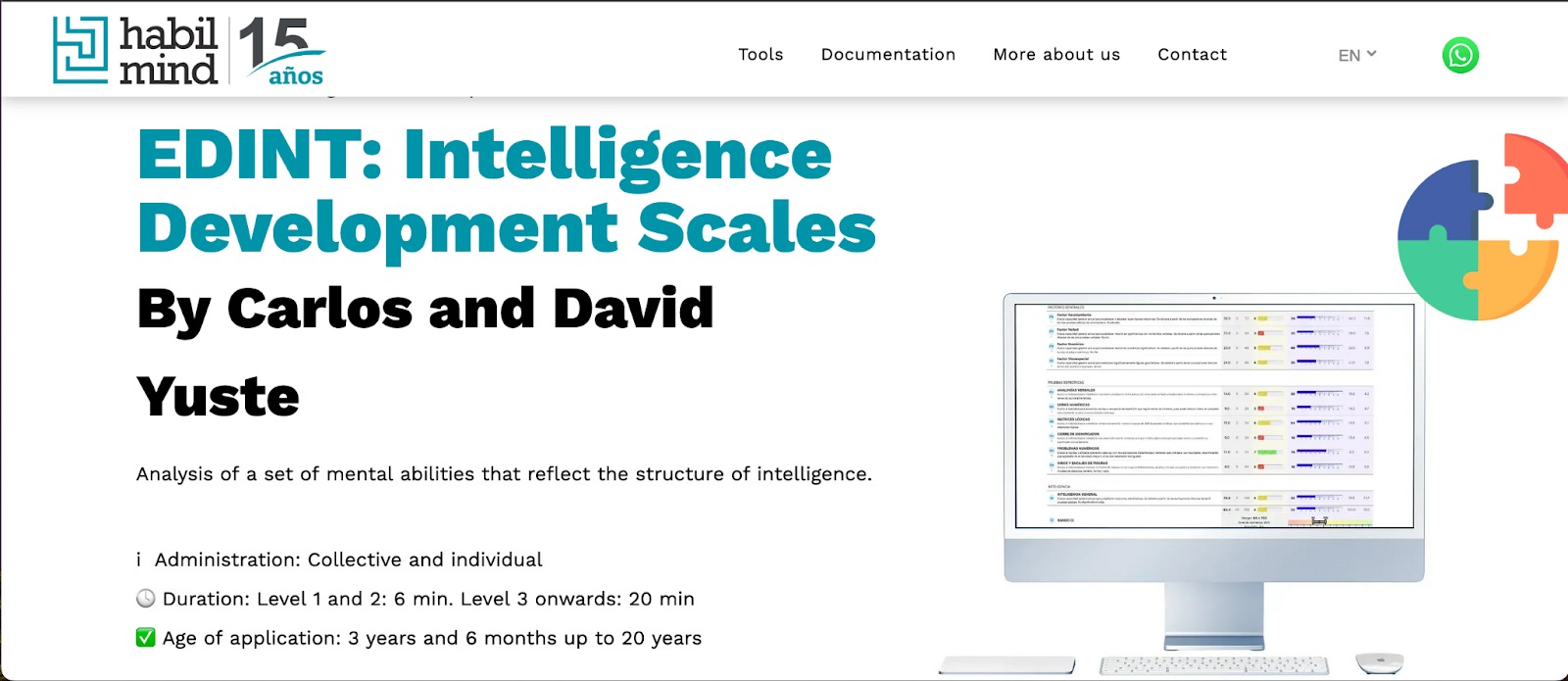
EdInt is an advanced online test management and proctoring service powered by AI. This innovative platform utilizes object recognition technology and motion recognition algorithms to simplify online testing for organizers, supervisors, and test-takers.
EdInt helps test takers establish their exam environment by using a camera to scan their surroundings for compliance. During the exam, its AI monitors behavior in real time and alerts supervisors of any suspicious activity, enhancing security and reducing costs. The platform also provides a detailed report and a full video of the test, offering valuable insights for organizers and educators. By prioritizing security and efficiency, EdInt is transforming the online testing experience.
Geniusee experience
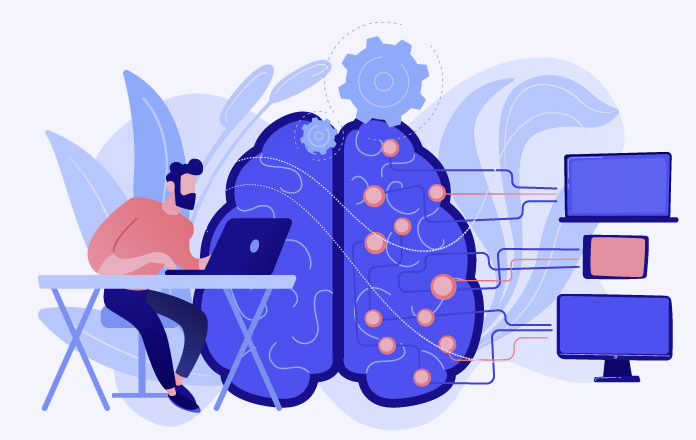
Why are we sure that artificial intelligence in EdTech is a real deal? The answer lies in our records. So let us tell you about some examples of using EdTech and AI from our practice.
SciQuiry
AI-powered question-based eLearning platform. It is tailored to personalize and upscale STEM education for middle and high school students. Our long-term and proactive collaboration concentrates on system redesign and customization of all elements to provide the most engaging, interactive, and finely gamified UI/UX design for children’s educational software.
MyTutor
My Tutor is a platform for personal tutors, students, and schools looking to uplift the learners' learning experiences. It provides private tutoring, homework help, and online tutoring programs for math, science, and language learners. We developed an educational platform that creates groups and appoints a tutor based on complex AI algorithms, creates timetables, and boosts assessments and feedback management.
Finance Unlocked
We developed a white-label educational platform for those seeking to deepen their finance expertise. This solution uses a personalized learning process and a profound data analysis, including user behavior. Intelligent team management brings corporate training to the next level.
ZaZa
ZaZa is an expert in online education abroad that helps its clients get the highest quality services at relatively affordable prices. They bring together native speakers worldwide to help those who need to learn a foreign language. ZaZa also ensures that all students have an enjoyable and unforgettable experience using gamification features. The platform also helps automate the learning process for teachers and students.
FactMata
FactMata is an AI-based platform that identifies and classifies content. Advanced natural language processing learns what different types of deceptive content look like and then detects them in the wild. To help the algorithms continually improve, FactMata uses communities including students, journalists, researchers, and advocacy groups, to provide constant feedback to help guide our AI.
Student
Future international students, educational agents, and AI EdTech startups involved in the university application preparation process come together on a single platform. Students own 2 main consultation domains: helping with education (entering university, courses, language study, etc.) and renting apartments. The Geniusee team developed the cooperation stage between agents and students on this platform. We also built the mobile application from scratch and updated the current one.
At the edge of the tech curve
Did you know that there’s another way to boost your software development? You’ve undoubtedly heard about ChatGPT delivering code and revolutionizing the IT industry. Here’s a secret — it helps. Of course, this code should be reviewed and edited by human developers. However, using AI-powered tools to deliver the code allows you to move faster on SDLC (software development lifecycle) and reduce costs significantly.
Here are some other pros and cons of AI-assisted development.
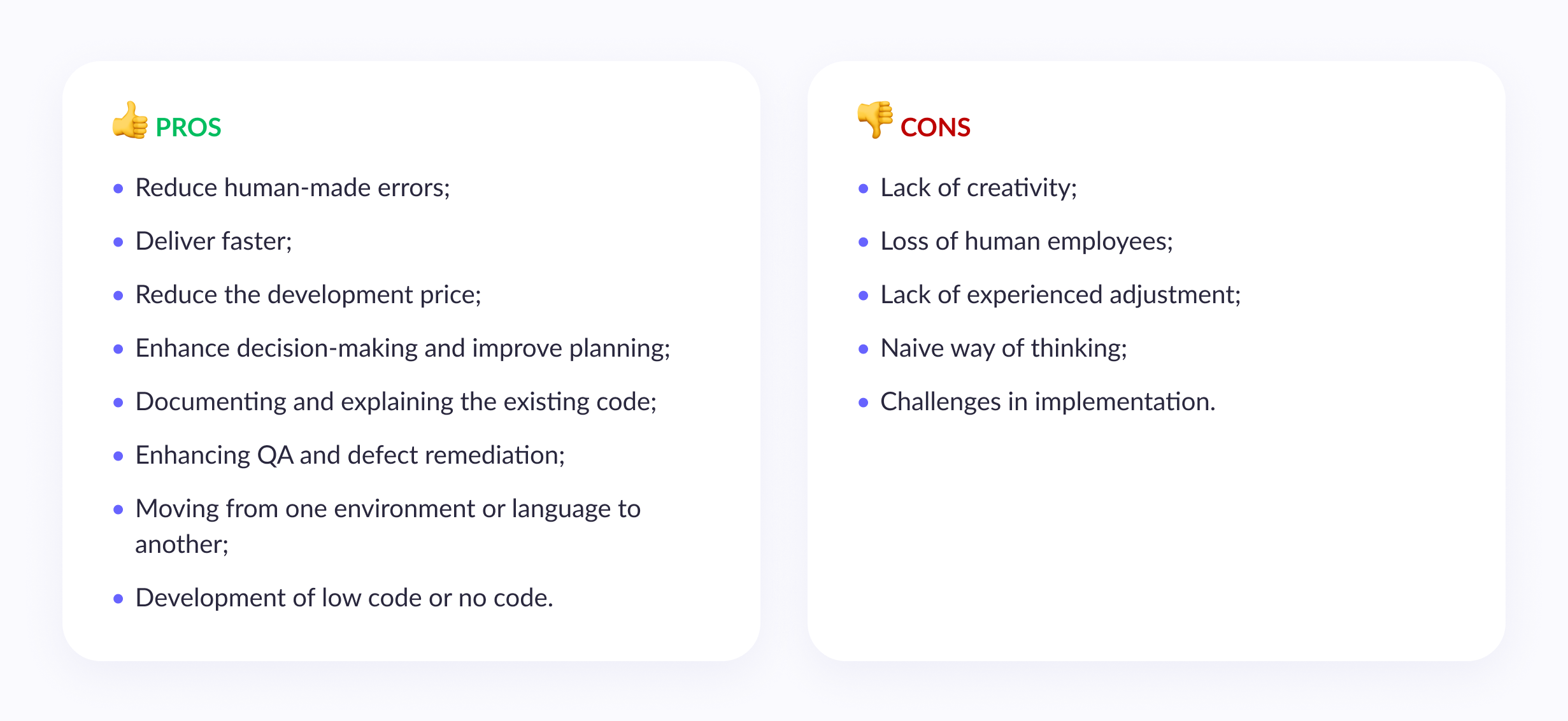
It's up to you to decide, but if you're interested in AI staff augmentation, Geniusee provides it. Consider checking it out!
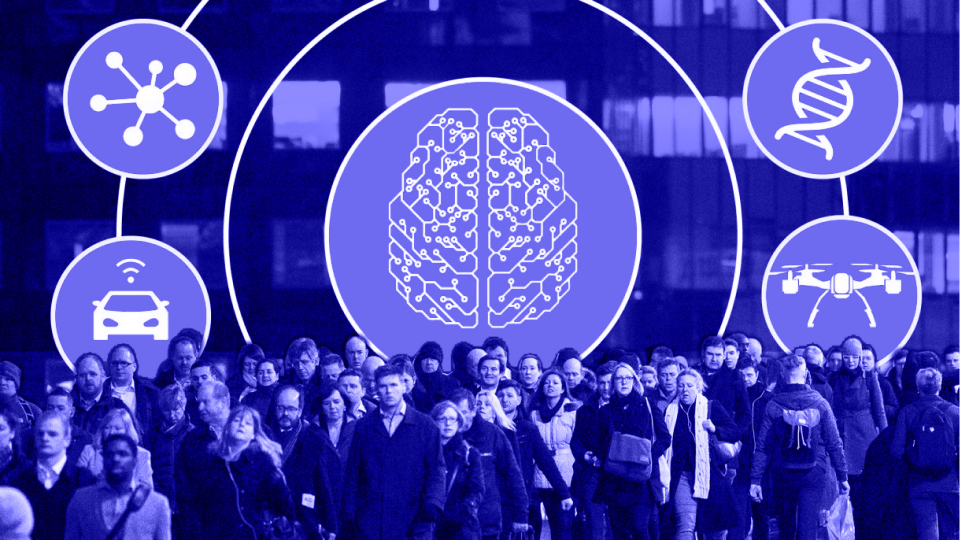
By the way
Boost your company with AI
Do you know that the use of AI-assisted development may decrease code cost up to 3 times?
Find out moreConclusion
By utilizing AI solutions like personalized learning, intelligent tutoring systems, and automated grading, education startups can offer tailored learning experiences that address individual needs.
AI also reduces teachers' workloads, enabling them to focus on providing mentorship and guidance. As AI and EdTech evolve, they will play a crucial role in creating efficient and engaging learning environments for students of all ages.
At Geniusee, AI developers concentrate on developing EdTech applications that utilize Artificial Intelligence. As experienced web and mobile application developers, we have developed learning platforms that provide personalized and engaging learning interfaces. Globally, Generative AI has demonstrated its real impact in education, from automatic assessment to personalized timetables. Now, our mission is to create solutions that revolutionize learning and its delivery processes.
Still, if you have any ideas but don’t know how to get them into reality, everything is simple: just fill out the contact form, and we will take care of the rest!

